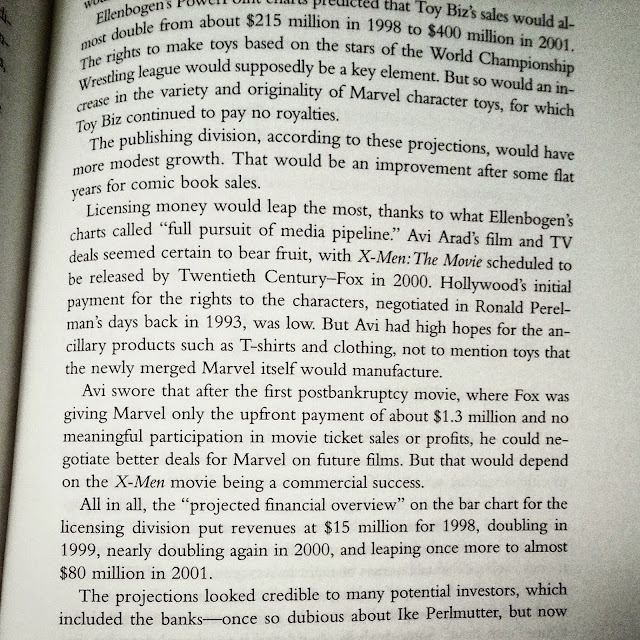Encapsulate the plot of this book in one sentence?
The financial woes in the 1990s of Marvel Entertainment Group - the corporate entity behind Marvel Comics - is explained.
When was this book published?
2002. This was a 1st edition hardcover in great shape that I bought at a comic shop for 5 bucks.
What's your verdict?
I remember reading a library copy of this book around the time of it's release; obviously, it's past its sell-by-date, because Marvel's fortunes have improved: it's part of the Walt Disney Company, it's film adaptations of their comics are box office smashes ( some more than others, to be honest )...who cares that it was faring poorly in the 90s? The past is dead!
...
I found it interesting that none of the financial wizards fighting for control of the company were into comics* - and that's why I found this book hard to enjoy: the author tried to make the events surrounding Marvel's leadership woes into a Wall Street/Wolf of Wall Street - esque caper, but there was no real hustle or careers at stake; sure, people got laid off, but the principals in this escapade - Ronald Perelman, Carl Icahn, Ike Perlmutter and Avi Arad - were never at risk of losing their fortunes and being put out on the street; this was all part of the game - Marvel Comics was just a pawn on a large chessboard.
The book reveals that Perelman was only interested in acquiring Marvel because of it's potential as a character licensing company, putting the characters on films, TV series and merchandise; when he learned, after buying the company, that the merchandising, film and television rights were already tied up, he began using the company as a platform for selling junk bonds and acquiring other companies that could correspond with Marvel's product licensing. There was nothing wrong with that - hoarding companies is a common practice. Is it a good idea? Well, you end up forming a conglomerate when you do that, and any failure within the conglomerate can create a domino effect that can bring it down to its knees. Perelman acquired the trading card companies Fleer and Skybox, the sticker company Panini, the distribution company Heroes World, and small-time rival Malibu Comics Entertainment ( only, the book reveals, because that company had developed a computer coloring system that could be run twenty-four hours a day for faster production ), and a controlling interest in a toy company, Toy Biz, which meant Marvel now had a stake in the toy-making industry.
And the comics were not selling well.
HOWEVER...
The book strongly implies that the company would've been headed for bankruptcy even if their comics sold well. The cause of Marvel's bankruptcy had nothing to do with overprintings of X-Men#1 and bad Spider-Man comics ( and depending on who you're asking, they're still making awful comics with those characters ).
Perelman's initial goal to push Marvel into licensing was actually a good idea - they've been doing it for the past decade, even beginning aggressive campaigns to get back the film rights to characters/franchises that were sold to other studios. This book is really an artefact representing a finger-pointing attitude people held during the late-1990s, when they were looking for someone to blame for why the medium almost died.
Do you plan to keep this book?
I'm not sure - it is like one of those old gimmick comic books from the 80s and 90s that promoted an event that was eventually revised and negated a decade later - it's claiming everything Perelman did was wrong, yet the current owners are doing the same thing, so it's okay, right? ...
Or perhaps there's gonna be a Crisis...
Or perhaps there's gonna be a Crisis...
Can you give us a good quote?
Sure. Check out the gallery below.
*actually, Avi Arad comes off as the only figure in the debacle who COULD have feelings about the source material behind the toys, t-shirts, video games and screenplays being cranked out, which explains why he is a major player in Marvel's current corporate hierarchy - after all, SOMEBODY in that boardroom has got to know what a "Spider-Man" is!











No comments:
Post a Comment